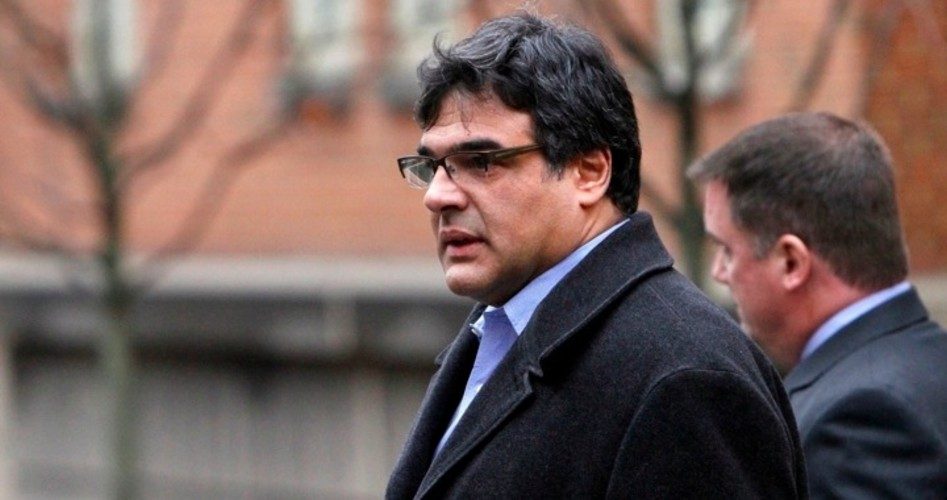
On August 8, U.S. District Court Judge Leonie Brinkema denied a CIA whistleblower’s motion to dismiss for vagueness and overbreadth charges brought against him by the Obama administration, charging him with disclosing to journalists the identities of CIA agents he alleges were involved in interrogating suspected “terrorists.”
John Kiriakou (pictured) was an agent with the Central Intelligence Agency (CIA) who was indicted earlier this year by a federal grand jury for disclosing to reporters the name of another CIA asset who was tasked with interrogating alleged al-Qaeda financier Abu Zybaydah.
The indictment included one charge of making false statements, which carries a maximum five-year prison sentence, and four counts of violating federal law, including the Espionage Act — an offense punishable by up to 10 years in a federal prison.
There is little wonder why the Obama administration would seek to silence Kiriakou: In 2007, Kiriakou told ABC News that he considered waterboarding an “unnecessary” form of interrogation.
In her order, Judge Brinkema ruled against Kiriakou, holding that the relevant sections of the Espionage Act and the Intelligence Identities Protection Act (IIPA) were not overly vague or overly broad and thus the charges against Kiriakou would stand.
In their motion, Kiriakou’s attorneys argued that several key terms in the statutes their client was charged with violating were not sufficiently clear and precise so as to afford him adequate notice of what aspect of his conduct was illegal and that “the problem of pervasive over-classification of information also rendered the Espionage Act provisions unfair to apply.”
The judge disagreed.
According to Judge Brinkema:
Defendant’s argument that perceived failures of the classification system are relevant to the constitutional analysis here is unpersuasive. Moreover, defendant cannot reasonably argue that the classified status of a covert agent and the [Rendition, Detention, and Interrogation (RDI)] program did not put him on notice that the information was closely held by the government, related to the national defense, and could harm the United States if disclosed.
As the judge’s memorandum explains, in order to prove that Kiriakou violated the Espionage Act federal prosecutors must demonstrate convincingly that the national security of the United States was potentially threatened by the information Kiriakou exposed. Further, as pertains to the IIPA violations with which he is charged, the government will have to prove that any agent of the United States mentioned in Kiriakou’s revelations worked outside the United States within the last five years.
Later in Judge Brinkema’s opinion, she speaks to the harm posed to national security by the exposure of the names of covert agents working on behalf of the United States:
The identity of a covert officer is information that goes to the heart of the nation’s intelligence activities, and its disclosure could very well threaten the personal safety of the agent whose identity is revealed as well as undermine confidence in the Government’s ability to protect its covert officers. This very real danger places exposure of a covert agent’s identity in a unique class of cases.
The trial on the merits of the government’s case against John Kiriakou is scheduled to begin in November. He has entered a not guilty plea to all charges.
As we have reported, Kiriakou is one of six similar individuals currently or recently prosecuted (some would argue persecuted) by the Obama administration. This apparent vendetta against such whistleblowers is in direct contradiction of the President’s promise to protect whistleblowers.
In 2008, then-president-elect Obama declared:
We need to empower federal employees as watchdogs of wrongdoing and partners in performance. Barack Obama will strengthen whistleblower laws to protect federal workers who expose waste, fraud, and abuse of authority in government.
Not that politicians have a habit of keeping campaign promises, but President Obama’s policy of zealously pursuing, prosecuting, and punishing those who report abuses in government is remarkable for its relentlessness.
This ferocity has come to the attention of others, as well. Speaking at a symposium on investigative reporting held in April at Berkeley, Edward Wasserman powerfully chronicled the chilling effect that the Obama administration’s pursuit of whistleblowers is having on such disclosures and against the journalists who report them.
Steven Aftergood, the director of the Federation of American Scientists’ government secrecy project, is quoted in a story published by Reason magazine online, explaining, “The administration’s aggressive pursuit of leaks represents a challenge to the practice of national security reporting, which depends on the availability of unauthorized sources if it is to produce something more than ‘authorized’ news.”
In his address at Berkeley, Wasserman, the Knight Professor of Journalism Ethics at Washington & Lee University, informed the audience, “[The Obama] Justice Department has conducted six prosecutions over leaks of classified information to reporters. Five involve the Espionage Act, a powerful law that had previously been used only four times since it was enacted in 1917 to prosecute spies.”
A story published by Politico confirmed that “the case [against Kiriakou] is the sixth of six leak-related prosecutions brought during President Barack Obama’s term — a higher tally than under all previous presidents combined.”
Supporters of the president may wonder why he didn’t think this through a little better and provide the whistleblowers with the protection he promised rather than seek to silence the journalists who break the stories given them by these well-informed sources.
The answer to that question was given in a comment made “rather gloatingly” by “a national security representative” to Lucy Dalglish, executive director of the Reporters Committee for Freedom of the Press: “We’re not going to subpoena reporters in the future. We don’t need to. We know who you’re talking to.”
Given this president’s propensity for rapidly and relentlessly enlarging the size and power of the surveillance state apparatus, it is certain that Dalgish’s statement is truer than we would like to believe.
Photo of John Kiriakou: AP Images



